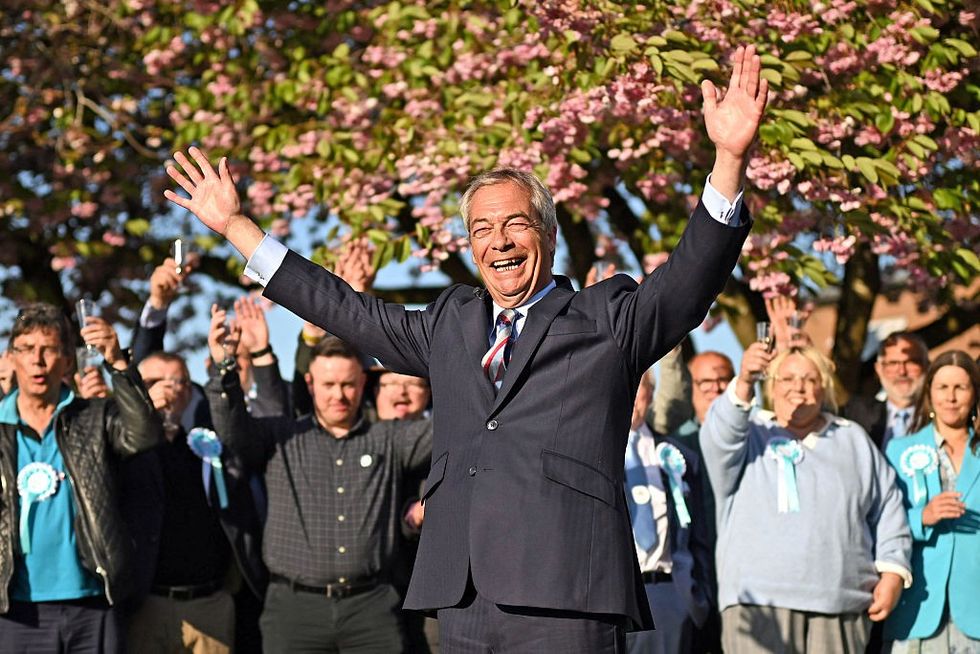Did Reform just break the dam? Inside the safe Labour seat that has flipped light blue for the first time

WATCH Nigel Farage to face new political opposition as Jeremy Corbyn prepares to launch Reform 2.0
|GB News

The result marks a significant breakthrough for the party in the area
Don't Miss
Most Read
Trending on GB News
Reform UK secured its first electoral victory in North Tyneside on Thursday, capturing the Killingworth council seat from Labour with a 38.5 per cent vote share.
The result marks a significant breakthrough for the party in the area, with both Labour and the Greens backsliding by over 22 and 16 percentage points respectively.
Labour's vote share plummeted by 22.7 percentage points to 31.9 per cent, while the Conservatives secured 21.4 per cent and the Greens 4.2 per cent.
The Liberal Democrats garnered 4.0 per cent of votes cast.

Reform UK secured its first electoral victory in North Tyneside on Thursday, capturing the Killingworth council seat from Labour with a 38.5 per cent vote share
|Getty
The by-election saw a turnout of 30.3 per cent in Killingworth, higher than the 24.7 per cent recorded in Longbenton and Benton, where Labour managed to retain their seat with candidate Bryan Macdonald.
The Killingworth result represents Reform UK's first council seat in North Tyneside, establishing an electoral foothold in an area traditionally dominated by Labour - though one just a few miles from the now-Reform-run Durham Council.
Despite Reform's victory, North Tyneside Mayor Karen Clark claims that the party does not pose a "serious threat" politically in the area.
"Reform has gained a seat and obviously we would have preferred to hold that seat," Clark told the BBC.
LATEST DEVELOPMENTS:
"It is always difficult when your party is in power. If Reform was a serious threat I would expect them to take both these seats," she added.
However, national polling data paints a starkly different picture.
An Electoral Calculus poll of 5,400 people conducted between May 30 and June 26 places Reform UK on 29.4 per cent of the vote nationally, with Labour trailing at 22.9 per cent.
The poll projects Reform would win 325 parliamentary seats if a general election were held now, just one seat short of an outright majority.
Brian Smith, Reform UK's victorious candidate, voiced his optimism about his party's future prospects.

Brian Smith, Reform UK's victorious candidate, voiced his optimism about his party's future prospects
|X
"This is the beginning for Reform in North Tyneside," Smith vowed.
The new councillor, who previously worked as a cleaner at JD Gym, added: "I'm not a political-type person."
And his first task, he said, was to get his "head around everything" and understand how the council operates. "It's about seeing how things operate - work out our priorities and who we can work with," he explained.
Smith also highlighted the positive reception his party received during campaigning. "Just on the door steps, talking to people, Reform have been very positively received and people are wanting change," he said.
Reform UK is turning its attention to the North East in a bid to replicate its recent momentum in the East of England, where the party has enjoyed a surge in local election success.
Buoyed by strong performances in council elections and recent parliamentary victories, Reform is now targeting traditional Labour heartlands, hoping to capitalise on what it sees as a growing appetite for political change among "left behind" communities.
The party will be hoping its North East strategy follows its results in the East of England. For years, areas like Essex and East Anglia provided fertile ground for Farage's parties.
UKIP and later the Brexit Party consistently polled well across these counties, tapping into voter frustration over immigration, national identity, and disillusionment with the Westminster establishment.
Despite these numbers, neither party managed to convert support into meaningful representation — until 2024, when Reform UK leader Nigel Farage and Rupert Lowe both won parliamentary seats, marking a historic breakthrough.
Now, with 14 years of Conservative rule followed by a year of Labour government, Reform sees a new political opening in the North East and wider Red Wall — regions that have undergone significant economic and social upheaval in recent decades.
The party made significant gains on May 1 - winning 10 councils, three mayors and an MP.
Whether this momentum can be sustained into the next general election remains to be seen, but Reform’s ambitions in the North East are now firmly on the political map.
More From GB News










